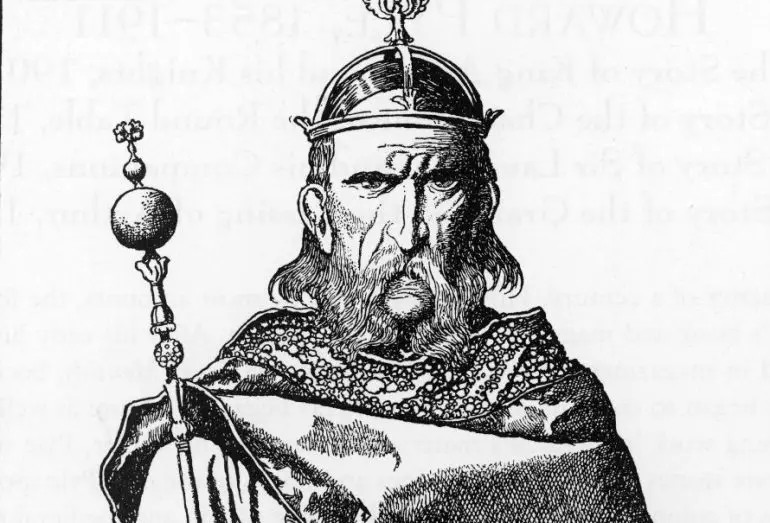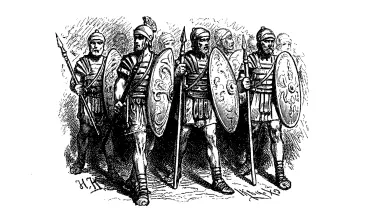Ambrosius Aurelianus stands as a captivating figure in the twilight of Roman Britain, straddling the line between historical reality and the mists of legend. Known to history primarily through the writings of Gildas and later by Bede, Ambrosius Aurelianus – known by his Anglicised name Ambrose Aurelian, and by his Welsh name Emrys Wledig – is often celebrated as a symbol of resistance against the encroaching darkness of the post-Roman era.
The question of his existence, whether as a genuine figure from the annals of history or a purely legendary creation, adds another layer of complexity to this incredible story. Was he a high king of the Britons? Did he have a significant impact on the course of early mediaeval British history? How does the legend of King Arthur intertwine?
This journey back to post-Roman Britain will try to unravel the complex, interwoven threads of fact and fiction surrounding Aurelius Ambrosius.
The Early LIfe of Ambrosius

Portrait of Uther Pendragon, father of King Arthur (Credit: Culture Club / Contributor via Getty Images)
Virtually nothing is known of the early life of Ambrosius Aurelianus with any degree of certainty. According to some versions of the story of his early life and family – probably written in the ninth century – he may have come from a noble Roman family who ‘wore the purple’, the imperial colour usually reserved for consuls, senators and emperors.
His father may have been named Constantine and rumours persist that this could have been Constantine III, who was declared emperor in Roman Britain in 407 AD. Constantine did have a son named Constans and according to Geoffrey of Monmouth’s twelfth century Historia Regum Britanniae, Ambrosius had two siblings, an older brother called Constans and a younger brother named Uther Pendragon, the father of King Arthur.
The story claims that Constans was murdered by fifth century British tyrant Vortigern, at which point Ambrosius Aurelianus and Uther Pendragon were taken to Brittany in France where they grew up.
Of course this information is pure conjecture, pulled from the scant, obscure and often contradictory information about Aurelianus, much of which was written centuries after he was supposed to have lived.
The First Mention of Ambrosius Aurelianus

Valens, brother of Valentinian (Photo by: Pictures From History/Universal Images Group via Getty Images)
The first mention of Aurelianus is in the sixth-century Latin work De Excidio et Conquestu Britanniae, or On the Ruin and Conquest of Britain, by Scottish-born Welsh cleric Gildas.
He was described as a figure of noble ancestry – Gildas referred to him as a Roman – who assumed the leadership of the Britons during a critical period of struggle against the invading Saxons. He portrays Ambrosius as a rallying point for the resistance, a courageous soldier who displayed the traditions and values of ancient Rome in a time of great turmoil. Such men were often known as the Last of the Romans, an exalted group which included Roman emperors Valens and Majorian and Roman generals Stilicho and Flavius Aetius.
Ambrosius Aurelianus & The Battle of Badon

King Arthur defeats the Saxons at the Battle of Mount Badon (Credit: Print Collector / Contributor via Getty Images)
One of the most famous British battles of the late fifth or early sixth centuries was the Battle of Badon, sometimes referred to as the Battle of Mons Badonicus.
Gildas described a stunning British victory which halted a Saxon advance. While he stopped short of specifically naming the British commander, many historians believe that it could have been Ambrosius, with later credit given to King Arthur.
The victory was said to have been so decisive it halted the Saxons for decades, bringing a much-needed peace to Britain. Was Ambrosius the illustrious leader of the Britons at the Battle of Badon? The debate rages on to this day, although there’s a scholarly consensus that he was at the very least a significant figure in the British resistance to the Saxons.
The Venerable Bede

Venerable Bede translating The Bible St John (Credit: Universal History Archive / Contributor via Getty Images)
Writing in Historia Ecclesiastica Gentis Anglorum, or the Ecclesiastical History of the English People – one of the most famous books of the Early Middle Ages – eighth century English monk Bede echoes much of Gildas’ words.
Bede briefly describes Ambrosius Aurelianus as a leader who emerged following the chaos and devastation caused by the Saxon invasions. Bede notes Ambrosius’s noble Roman lineage and describes him as a figure who, in the absence of strong leadership, took charge and rallied the Britons against their enemies.
Through this account, Bede contributes to the historical narrative of Ambrosius as a significant leader during a tumultuous period in Britain’s history, reinforcing his legacy as a defender of the British people.
Merlin, Ambrosius and the Arthurian Legend

Merlin, magician of Arthurian legend (Credit: Universal History Archive/Universal Images Group via Getty Images)
Ambrosius Aurelianus is often considered a historical precursor to the legendary King Arthur. Some traditions, particularly those influenced by Geoffrey of Monmouth’s twelfth century Historia Regum Britanniae, or The History of British Kings, cast Ambrosius as a foundational character in the Arthurian saga, portraying him as a king or war leader with strong Roman ties who lays the groundwork for Arthur’s reign.
Within the rich tapestry of Arthurian legend, the figures of Merlin, Ambrosius Aurelianus, and King Arthur are intricately woven together, with Ambrosius serving as a pivotal bridge between the mythical and the historical.
Merlin, the legendary wizard, is sometimes associated with Ambrosius through the figure of ‘Merlin Ambrosius’, blending the historical Ambrosius’s legacy with the magical and prophetic qualities attributed to Merlin. This amalgamation enriches the Arthurian narrative, suggesting that the roots of Arthur’s kingdom are deeply entwined with Ambrosius.
Through this connection, Ambrosius not only contributes to the historical context of the Arthurian legends, but also symbolises the transition from the tangible struggles of post-Roman Britain to the legendary realm of King Arthur, where history and myth converge.
Were Ambrosius Aurelianus & King Arthur the Same Man?

King Arthur (From Livro do Ameiro-Mor), 1509 (Credit: Fine Art Images/Heritage Images via Getty Images)
This question has intrigued historians and scholars for centuries, leading to a complex web of theories and interpretations. Based on the historical records and literary traditions, it’s generally accepted that Ambrosius Aurelianus and King Arthur are distinct figures, each playing separate roles within the history and mythology of post-Roman Britain.
Ambrosius is documented in historical texts, most notably by Gildas and later by Bede, as a real leader.
King Arthur, on the other hand, emerges primarily from the realm of legend, with his exploits at the Battle of Badon and other feats forming the core of Arthurian tales. Arthur’s historical existence is debated, as – crucially – he is conspicuously absent from early historical sources such as those by Gildas, Bede, and the Anglo-Saxon Chronicle. The association of Arthur with the Battle of Badon becomes prominent in later sources, particularly in the ninth century Historia Brittonum and the twelfth century works of Geoffrey of Monmouth, which significantly contributed to the development of the Arthurian legend.
The lack of direct mention of Arthur in the earliest historical accounts, despite his supposed significance almost exactly when Gildas was at his most productive, has fueled speculation about the origins of his legend. Some theories suggest that Arthur may have been inspired by one or several historical figures, possibly including Ambrosius Aurelianus, who could have been mythologised into the figure of Arthur.
However, the consensus among historians is that while Ambrosius Aurelianus was a real historical figure, King Arthur is a separate, predominantly legendary character, whose historical basis remains elusive.
The Ambrosius Ambiguity

Roman dodecahedra have been found across Roman Britain (Credit: Andy McGarry via Getty Images)
Ambrosius Aurelianus remains an enigmatic yet pivotal figure in the twilight of Roman Britain, embodying a people caught between the dusk of the Roman Empire and the dawn of a new, fragmented era fraught with conflict and transformation.
While the lines between history and legend blur, particularly with the speculative ties to King Arthur, Ambrosius’s legacy transcends the mere facts of his existence. As the purported ‘Last Roman in Britain,’ Ambrosius Aurelianus stands not only as a figure of historical interest but as a leader whose story is woven into the very fabric of Britain’s rich and complex heritage.












